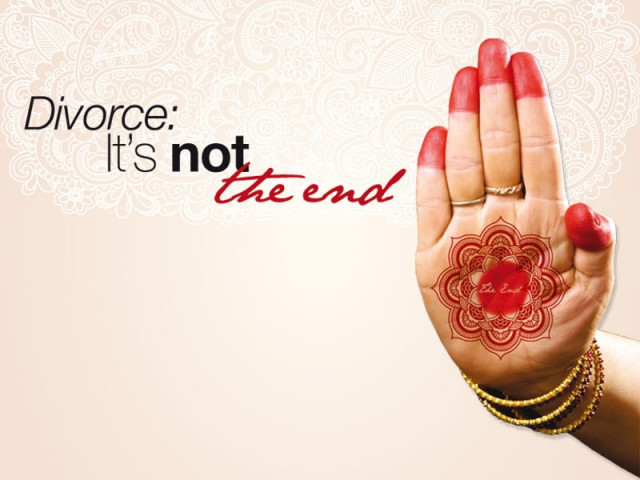Divorce: It’s not the end
Ms.T explores the trials and tribulations of divorcees in our society and how they can overcome them.

Ms.T explores the trials and tribulations of divorcees in our society and how they can overcome them.
At this time, it helps to think of divorce not as an end in itself, but a path that some of us have to be strong enough to take. The most empowering thought for a woman is that what she has left behind was much worse than what she has now. This reflects her strength and can be a great confidence builder. While women who opt for divorce are strong enough to come to a difficult decision and have only the memories of their misfortune, what is more tragic is the greater number of women who continue to live that misfortune, only to avoid an option that is both sanctioned by religion and facilitated by law.
Coming to the decision to take a divorce is often the hardest part. Soon after her wedding, Saima* recognised her husband’s strange temperament. While her friends envied her for getting married to a handsome and dashing man, Saima knew better. Her husband would take offence at anything at all and violence and verbal abuse would break loose. Too scared to utter a word of complaint, Saima had the horrible feeling of walking on eggshells all the time. It was only when the domestic violence could no longer be hidden that her neighbours called up her parents one day. Finally, with the support of her parents, Saima took the bold decision of divorce. For a year after that, she spent all her time at home, moping, repenting, accusing, stuck in a cycle of self-pity. “What was even worse than people’s wagging tongues,” she says, “was the pity that they had in their eyes for me.”

Naila Mir has done her Masters in Behavioral Sciences and works as a counsellor at National University of Science and Technology. Over the past 15 years, she has seen countless divorced couples. Talking about the emotional effect of divorce, Mir says that the self-esteem of women often becomes low, and some might feel rejected. In some cases they might even feel regret and remorse, thinking they could have saved the relationship in some way. Luckily for Saima, her family pushed her to enroll in a Masters program. Soon after, she got married to someone who turned out to be a much better man. Today, Saima is happy that she pursued divorce, and she regrets that she spent that one year after it in misery and ingratitude.
While society may look down on divorce, it is important to remember that divorce is sanctioned in Islam. The religion might discourage the breakdown of a family, but it does allow for an exit from an unviable marriage. The Prophet (PBUH) himself married divorced and widowed women, something that people in Pakistani society may not. While people may consider divorce a matter of shame, it is important for a woman to stand up for herself and fight against being labeled ‘unfortunate’; to know that her ‘bad luck’ has not made her less than anybody. She has enough challenges to focus on, as it is.
For one, she undergoes a traumatic, life-changing experience: not just the divorce but the marriage. To move on from the past, no matter how horrible, is difficult in itself. To know where to go, is even more so. But once you move on, there is no looking back, and you can easily reclaim your life from a horrible marriage. Shazia* says that her divorce was the most terrible incident of her life at the time. “Then, it seemed like the end of the world, but now I hardly think of it at all,” she says. “It seems so long ago, in another life.”

Ill-treated by her husband, she got divorced after only a year of marriage. During the process, she felt devastated and depressed. When her son was born, her husband abandoned him saying he was no different from the countless orphans in the world who grew up just fine. Not long after her divorce, her younger sister got married. The festivities depressed her, reminding her of her own wedding and her broken dreams. For some time, the news of her divorce was kept secret and extended family members advised her to save her home. “But I knew that my home was broken already,” says Shazia.
One day, Shazia’s grandfather came over, and argued with her father for making the wrong decisions. While all the extended family members listened, it hurt her to have her personal life discussed this way. But Shazia stayed strong during her trial. She brushed off people’s acidic remarks and tried not to worry over her the uncertain future that lay before her child. Although she was broken and depressed, her mother motivated her to make the best of what she had. While she had already completed her MBBS degree and house job before marriage, she made use of her prior studies and went on to specialise. With the support of her parents and family, who looked after her son while she was away, she did not let one bad experience ruin her life. She braced the world confidently, knowing that she was not wrong and had nothing to be ashamed of. Today she is an accomplished doctor, happily married to a wonderful man, and is a loving mother of three.
Dr. Sohail Abbas, a psychologist, shared some insights about his female patients. “Arranged marriages are a norm in our culture and even today most girls accept their husbands as someone who was written in their fate. However, a growing number of girls from the middle and upper middle class, when married to someone who is totally incompatible with them, show their bitterness over the bad choice made by their parents. Either these marriages end in divorce or the girl lands in depression and blames her parents for not properly scrutinising her partner before the wedding and in the process, lose the support of even their parents.” According to the doctor, divorce can be doubly hard for a woman who thus loses the support of her parents. “In case of a divorce,” continues Dr. Sohail, “despite the girl being financially and professionally viable, it is hard for her to live alone and thus she returns to her parent’s house or the house of her brothers. Her feelings of being dependent and a burden on their family, in addition to day-to-day conflicts with their sisters-in-law etc again lead to depression”
Two years into her marriage, Sara* discovered that her husband was gay. Mother of a small daughter, she came to the brink of divorce. As she sat with a whole bottle of sleeping pills in her hand, she realised that she had to be strong for her daughter. Not wanting to worry her parents, she quietly separated from her husband. Married at a young age, she had no degree but taking short courses, and doing small jobs, she worked her way to being a successful event manager. Sara chose not to let her marriage ruin her and her daughter’s life and chose a peaceful path. According to Naila Mir, if a divorce takes place amicably, it does not have a devastating effect on children, as when both parties play the blame game. She advises that when a couple has decided that their marriage cannot work, they should separate peacefully.
These women were just as severely tested as many other divorced women in Pakistan. But they stayed strong. They accepted the unfortunate circumstances of their life as bad luck, and struggled to move on, instead of dwelling into self pity or looking to society for approval. It was a trial which they passed with patience.
*Names have been changed to protect privacy.
Published in The Express Tribune, Ms T, June 30th, 2013.
Like MsT on Facebook, follow @TribmagMsT on Twitter for your dose of girl talk.


















COMMENTS
Comments are moderated and generally will be posted if they are on-topic and not abusive.
For more information, please see our Comments FAQ